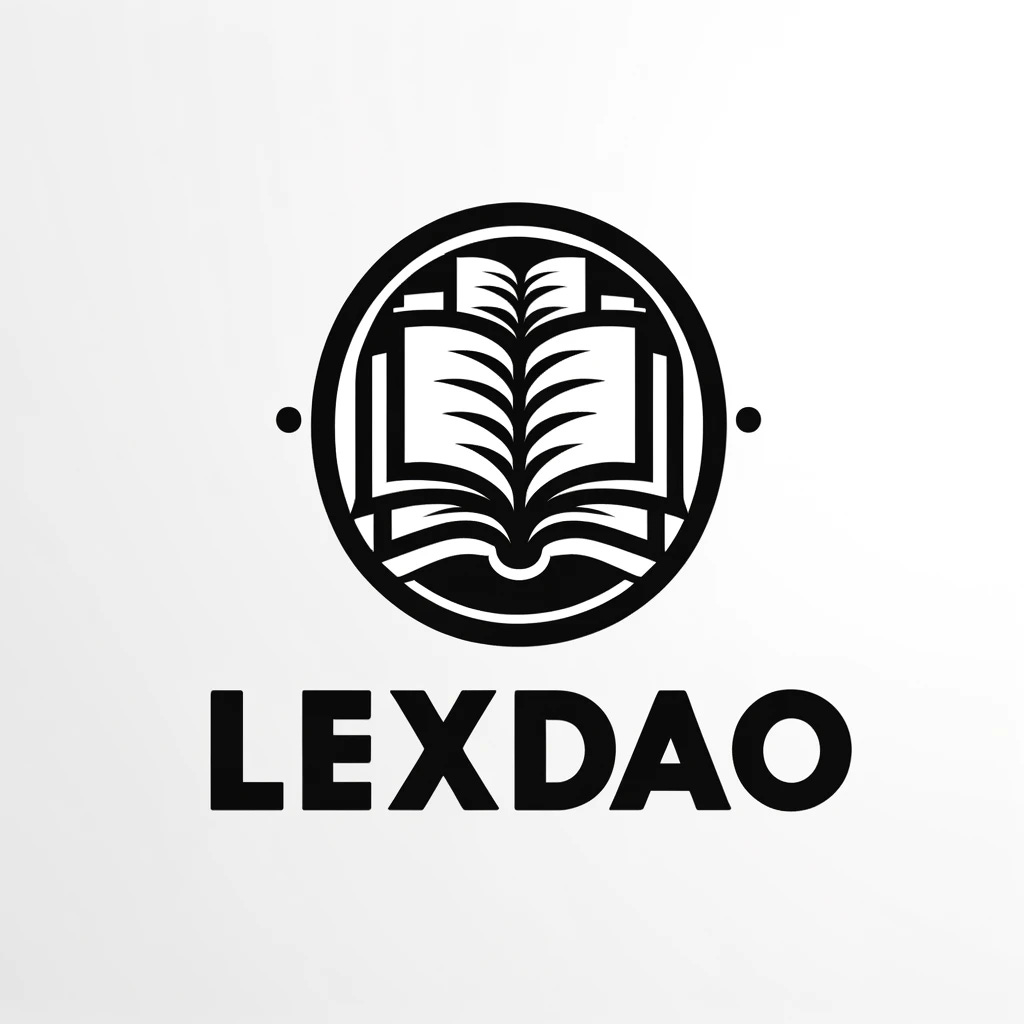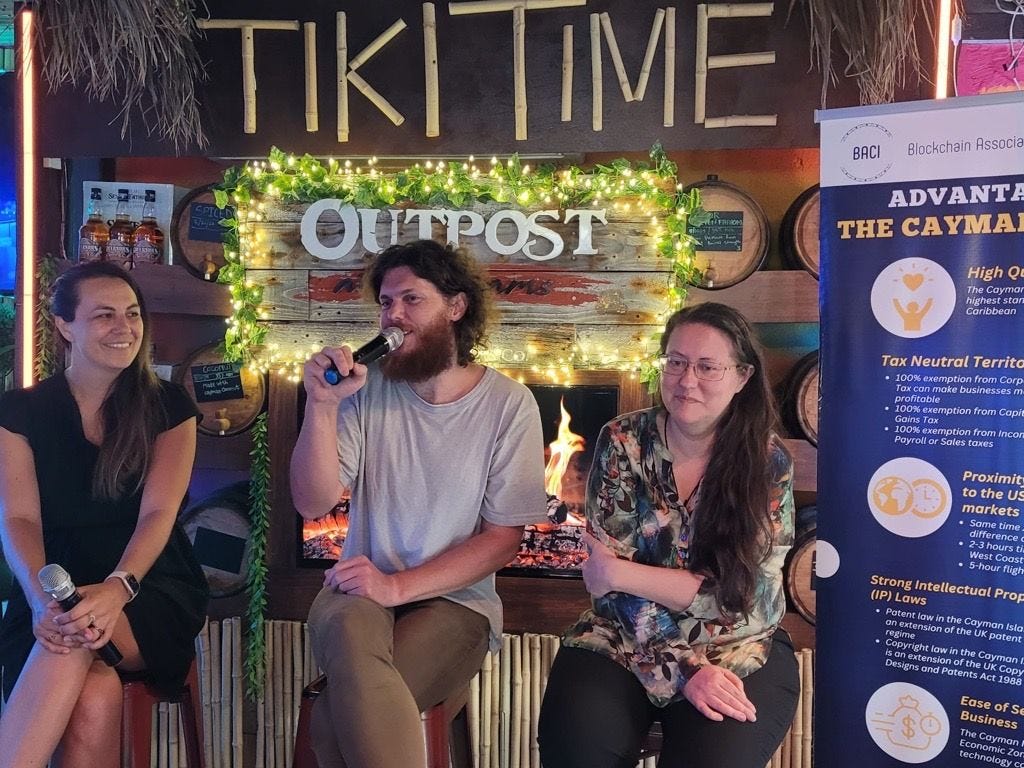April 2024 Recap
April showers bring may followers!
The time has come again to join us for your favorite web3 newsletter from your favorite guild of legal engineers! See what’s happened in April in this edition of the LexNews+ Monthly Newsletter that’s been packed to the brim!
What’s New at LexDAO
LexDAO’s members have been keeping busy writing informative articles, partaking in discussions with the web3 community, and planning events for our members. Keep reading to learn about how DAOs provide an alternative to traditional cooperative structures, Wyoming’s new DUNA entity structure, what we’ve been reading, and much more!
Collective Ownership Through DAOs
written by @haroldo_msn
Since their inception as grassroots, community-led groups of people operated, controlled, and owned by and for their members (deja vu!), cooperatives have served as a fundamental means for the collective ownership of productive assets. This article does not aim to critique cooperatives, the OG autonomous associations. However, the legislative frameworks governing cooperatives, created centuries ago, appear slow and inefficient by today’s standards. Over some two hundred years, the cooperative model has been largely successful as there hasn't been a better alternative for it than the cooperative entity. The possibility of collective ownership with DAOs is an interesting and flexible alternative to state regulated cooperatives. The ensuing analysis assumes the usage of an LLC or DAO LLC as the DAO’s legal wrapper and not a more centralized entity type.
In many senses, DAOs are the spiritual kin of cooperative entities, with an emphasis on joint governance and ownership by its members, and the contribution of capital, assets and labor towards a shared objective. Given these similarities, why might such a DAO present a better alternative for collective ownership?
Decentralization. The majority of US states require cooperative entities to have a Board of Directors and comply with other corporate governance standards. Even in states that do not require a Board of Directors, elected Officers are usually required to oversee day-to-day operations and act as the cooperative entity’s agent.
A DAO, on the other hand, can feasibly be (and most commonly is) governed directly by its members. If a DAO needs to grant anyone with temporary agency for a specific task in the physical world, that can be easily accomplished with a verifiable on-chain proposal. Although cooperative entities are not as centralized as corporate structures, the decentralization that DAOs allow matches the cooperative ethos more so than the traditional cooperative entity.
Financial Records. Transparency and accountability are considered important values for DAOs and cooperative entities, likely in equal measure. Cooperative entities must, however, share annual reports including financial information with state regulators, as well as maintain records of patronage allocations, distributions and related calculations. Additionally, in many circumstances there are state-mandated audits for cooperative entities.
Transparency into a DAO’s financial records is a much simpler matter as all transactions are verifiable on-chain.
Voting. In contrast to DAOs, cooperative entities use paper ballots or centralized digital systems for voting. Even the cooperative entities that do not use paper ballots face a trust element in interpreting voting results due to several factors. First, these digital systems are still centrally controlled by either someone from the cooperative entity or at a third-party service provider. Second, data integrity is always a concern for digital records that are not immutable. Third, the mechanisms for verifying and auditing voting results in these digital systems is also subject to central control. All of these deficiencies in using centralized digital systems for voting are resolved by on-chain voting.
From the point of view of actually owning productive assets, there are more similarities than differences between the two entity types. Just as the cooperative entity owns the asset in its own name, the DAO’s legal wrapper would own the assets in its own name. The DAOs advantages lie in the greater flexibility, transparency and lower administrative burden when compared to cooperative entities. These advantages create real value for members and have the potential to foster a more widespread adoption of collective ownership models. Communities seeking to collectively own real estate, infrastructure networks, or any other productive asset should seek out legal and tax advice to ensure that they structure things appropriately. This article is informative and does not constitute any form of legal, financial, or other advice.
A Deep Dive into the Wyoming DUNA
written by Christian Dike
Introduction
DAOs are to Corporations what Democracy was to Monarchy — Paulo Fonseca.1
Decentralized Autonomous Organizations (DAOs) are web3 primitives that enables people to coordinate towards a common purpose without a centralized governance structure. However, in order for DAOs to thrive in the real world, they require a legal structure (or “wrapper”) that cements their legitimacy.
This article is a deep dive into the Decentralized Unincorporated Nonprofit Association (DUNA), a DAO-specific legal structure established by the state of Wyoming.
The article explains why DAOs need a legal structure and more importantly, a DAO-specific one. We examine the traditional legal structures adopted by DAOs, alongside previous attempts at creating a DAO-specific legal structure. Finally, we take a closer look at the DUNA, its features, how it compares with traditional legal wrappers, and its potential advantages and disadvantages.
What is the Need for DAO-Specific Legal Structures?
To understand why DAOs require DAO-specific legal structures or legal structures at all, it is necessary to first of all understand three key challenges faced by DAOs:
Legal existence: A DAO needs a legal structure in order to become a legal entity and gain legal existence. Without a legal existence, a DAO cannot enter into contracts, own property, sue persons in its own name, and exercise other legal rights.
Tax/regulatory compliance: Without a legal existence, a DAO has no ability to pay taxes or effectively comply with regulations.
Liability of members: A legal existence allows a DAO to become separate from its members so that they cannot be held personally liable for the DAO’s activities.
DAOs generally address these challenges in two ways:
Entityless structure: Many DAOs operate without any legal structure or as a non-legal entity. Adopting this structure leaves DAOs exposed to all three of the aforementioned challenges.
Legal Entity Structure: This entails adopting different kinds of established legal structures that confer DAOs with legal existence. These structures range from the less common Corporation, Unincorporated Nonprofit Associations (UNAs), and Limited Liability Companies (LLCs), to the more commonly adopted offshore foundation structure, which warrants a closer look. The foundation structure combines features of a corporation and a trust and provides DAOs with several benefits: legal existence, limited liability for members, the ability to engage in profit and nonprofit activities, and even no taxes.
While DAOs can generally piggyback on any one of these legal entity structures, they are generally unsatisfactory because they require significant human input, are highly complex and expensive, and create uncertainty for DAOs in terms of tax and regulatory compliance. Most importantly, these legal structures are not DAO-specific.
What were Previous Attempts at Creating DAO-Specific Legal Structures?
DAO LLCs
Prior to the DUNA, the DAO LLC was the only significant attempt at creating a legal structure tailored for DAOs.
A limited liability company (LLC) is similar to a corporation in the sense that it establishes a business as a separate legal entity, thereby shielding its members from personal liability for the business. However, like an unincorporated entity, an LLC may a pass-through entity for tax purposes. The profits of an LLC are typically attributed to its members who are then individually taxed, with the LLC itself not being taxable. The laws of certain jurisdictions allow DAOs to adopt the LLC structure, with some additional features. Under Wyoming’s DAO Supplement, in addition to the general LLC features, DAO LLCs cannot not be manager-managed, and the fiduciary duties of members to the DAO can be waived. DAO LLCs and their equivalents are similarly available under the laws of Tennessee, Utah, Vermont and the Marshall Islands.
The DAO LLC structure, despite representing a forward leap in DAO-specific legislation, has garnered little adoption. The structure has been criticized because of the tradeoffs it requires of DAOs and its general lack of suitability to DAO operations. Pass-through taxation, paperwork requirements, restrictions on manager-management, and the requirement of state representatives are all features of DAO LLCs that are considered to be against the notions of pseudonymity and flexibility that are fundamental to DAOs.
What is a DUNA?
A Decentralized Unincorporated Nonprofit Association (DUNA) is a type of legal structure specifically designed for DAOs. DUNAs are established under Wyoming’s DUNA Act which comes into effect on July 1, 2024. It represents the most recent leap towards creating a DAO-specific legal structure.
On surface level, the name “DUNA” partly comes off as a misnomer. This is because of the “unincorporated” and “nonprofit” contained in its name. Despite this nomenclature, a DUNA is technically an incorporated entity in the sense that it has a separate legal personality. DUNAs can also engage in profit-making activities although this must ultimately be in furtherance of a non-profit purpose.
DUNAs can be thought of as an offspring or improved version of UNAs with slight modifications making them tailored to DAOs.
What are the Key Features of a DUNA?
Pursuant to the Wyoming DUNA Act, DUNAs are legal entities with the following features and structure:
Separate Legal Entity: DUNAs provide DAOs with legal existence, allowing them to exercise rights as a legal entity.17-32-105;108. Importantly, this enables DAOs to comply with tax and regulatory requirements.
Limited Liability: As a separate legal entity, a DUNA is distinct from its members. Therefore, the members of a DAO utilizing the DUNA structure cannot be held liable for the actions of the DAO. 17-32-107. This protection also extends to persons who are authorized to manage certain affairs of the DAO, referred to as Administrators. 17-32-102(a)(i).
Nonprofit Purpose: DUNAs are nonprofit organizations. This means that they must possess a nonprofit purpose.17-32-104(a). This conveniently aligns with the ethos of many DAOs which set out to promote public goods or benefits. The specific purpose(s) of a DUNA is governed by its Governing principles. 17-32-102(a)(vii).
Distribution of Profits: Despite their nonprofit status, DUNAs can engage in profit-making activities to the extent that its profits are channeled into its nonprofit purpose. As a result, DAOs cannot distribute profits to members under the DUNA structure. However, DAOs can pay “reasonable compensation” to members, administrators or third parties for services rendered. 17-32-104(c)(i). “Services” is not exhaustively defined in the DUNA Act and can range from voting on governance proposals to general participation in DAO activities. Profits can also be distributed to members in conformity with the DAOs nonprofit purpose. 17-32-104(c)(ii). Both these provisions have a broad interpretation to the advantage of DAOs, as the Act fails to provide any strict definitions. DAOs can potentially leverage these provisions to effectively distribute profits to its members. This transforms what appears to be one of the loopholes of the Act into one of its more appealing features.
Governing Principles: As articles are to a corporation, Governing principles are to a DUNA. The Governing principles govern the purpose, operations, rights, and duties in a DUNA. It is determined by the members, it doesn’t need to be contained in a single document, and may be implied from practice. This is suitable to the modus operandi of DAOs which make operational decisions through governance proposals, forums, and discord channels, providing DAOs with operational flexibility without the hassle of formal documentation. 17-32-102(a)(vii).
Management Structure: As Directors are to a corporation, Administrators are to DUNAs, with the major difference being that Administrators are optional in DUNAs.17-32-123. Otherwise, members generally drive the operations of a DUNA.
What Gives DUNAs an Edge Over Other Legal Structures?
DUNAs vs The Corporation
Corporations require a centralized management body with fiduciary duties (i.e. Directors). This is antithetical to the “D” in “DAO”. Only Administrators come close to resembling Directors in a DUNA, and even so, the use of Administrators is merely optional. Additionally, DUNAs are largely free from the burdensome compliance procedures that corporations are subject to, allowing them a great deal of flexibility.
DUNAs vs Foundations
Foundations require governance bodies such as a Board of Directors, Foundation Council or Guardians. This compromises decentralization for DAOs. There is no required governance body for a DUNA. Furthermore, setting up and maintaining offshore Foundations is expensive and requires filings—the opposite is true for DUNAs.
DUNAs vs UNAs
DUNAs are quite literally decentralized UNAs. A DUNA being a DAO-specific legal structure makes it a better choice for DAOs than the ordinary UNA structure. This is because tailored legislation provides DAOs with clarity, protects them from the risks of potential amendments that alter the suitability of UNAs to DAOs, and allows for unique interpretation of rules.
DUNAs vs DAO LLCs
A DAO LLC subjects members to pass-through taxation, while DUNAs do not. The counter-argument is that DAO LLCs can equally distribute profits to members while DUNAs cannot. However, DUNAs can compensate members, and the language and provisions of the DUNA Act are sufficiently broad enough to allow this to be done to a great degree. Additionally, membership arrangements (regarding transfer of rights, admission, removal, etc.) are flexible in a DUNA with no paperwork or filing requirements. Such requirements are obtainable in DAO LLCs.
What are the Pros and Cons of DUNAs?
Pros
Decentralization: DUNAs offer a way for DAOs to gain legal existence without compromising on decentralization and autonomy. DUNAs do not envisage a centralized management structure and it is completely up to its members to steer the operations of the DUNA by defining its governing principles.
Regulatory Certainty: By bringing DAOs under the laws of a state, the DUNA structure provides much-needed regulatory clarity and certainty. This is especially beneficial for DAOs that interact with the US economy. This approach is superior to adopting offshoring strategies (such as the foundation structure) which can ultimately expose DAOs to US laws and unforeseen legal challenges.
Simplicity: When compared to other legal entity structures, DUNAs are exponentially cheaper to set up and maintain, requiring no state filings or registration fees. DUNAs also have an easy to understand structure. This allows DAOs to maintain flexibility and smooth operations without cumbersome requirements.
Cons
Novelty: The DUNA is a new type of legal entity. This comes with its own risks. For all their undesirable features, traditional legal entity structures have been firmly established through years of judicial precedent, giving them a degree of reliability and predictability which DUNAs cannot yet boast of.
Ambiguity: The Wyoming DUNA Act contains some ambiguities that could lead to legal dispute in the future. For example, the Act does not define “reasonable compensation” for members or what it means for a DUNA to “confer benefits to members in conformity with its nonprofit purpose”.17-32-104(c). These provisions are open to wide interpretation and require clearer definitions. This is key to prevent DAOs from being found in violation of the Act due to wrong application of these provisions.
Conclusion
The DUNA is a new kind of legal structure that represents a significant leap forward from traditional DAO legal wrappers. DUNAs provide DAOs with legal existence, the ability to comply with tax and regulatory requirements, and limited liability for DAO members. DUNAs confer these benefits on DAOs while allowing them to maintain their ethos of decentralization and permissionlessness by empowering members as the driving force of DAOs. In contrast to conventional legal wrappers, DUNAs offer DAOs regulatory certainty, especially within the US, and are much simpler to establish and manage. DUNAs therefore hold a lot of potential as the go-to legal wrapper for DAOs and DAOs can leverage on the DUNA structure to establish their legal status.
This article does not constitute legal advice.
Sources
Legal Wrappers and DAOs by Brummer, Christopher J. and Seira, Rodrigo
Legal Wrappers For DAOs & Their Importance by Barnabas Atam
Wyoming built a home for DAOs, but they won't come by Joshua Durham
Decentralized Unincorporated Nonprofit Associations (DUNAs): Empowering Web3 Ecosystems by Adilah Holivay
The DUNA: An Oasis For DAOs by David Kerr and Miles Jennings
Legal Framework for DAOs by David Kerr and Miles Jennings
Legal Framework for DAOs - Pt II - Entity Selection Framework by David Kerr and Miles Jennings
A Legal Framework for Decentralized Autonomous Organizations - Part III: Model Decentralized Unincorporated Nonprofit Association Act by David Kerr and Miles Jennings
The Rise of Decentralized Autonomous Organizations: Opportunities and Challenges by Aaron Wright
Limited Liability Company (LLC): What is it, Advantages and Disadvantages by Nolo
Should You Form a Pass-Through Entity? by Nolo
Wyoming passes law to give DAOs a nonprofit legal framework by Blockworks
Study Group Session discussing the DUNA
LexDAO’s Paolo Maria Gangi (@pmgangi) moderated a Study Group Session on April 4 to examine the DUNA with a panel of experts, including David Kerr, principal at Covary; Miles Jennings, General Counsel and Head of Decentralization at a16z; Jordan Teague, partner at Campbell Teague; and Ramona Tudorancea, founder of Jupiter Block and partner at Ixian. The panelists delved into the intricacies of DUNA and its potential to resolve some of the legal challenges faced by DAOs. The discussion covered how this new tool may help bridge the gap between DAOs and traditional legal entity structures, from the current legal landscape of DAO, the important of legal existence and limited liability, the importance of planning legal structures, and how DUNAs relate to other entity structures outside the US.
A big thanks to Paolo for organizing the event and to all of our expert panelists for joining us! Watch the session here to learn about DUNAs and the role they may play for DAOs, and stay tuned for more Study Group Sessions to come.
Kyle Smith a.k.a Bestape on Futurelaw and Earth Commons
LexDAO’s Kyle Smith recently published a writeup on his time at the Computable Contracts and Institutional Ecologies conferences at Stanford and the Earth Commons and Funding the Commons conferences at UC Berkeley. The piece gives a detailed account of Kyle’s time at each of these events and his continued efforts to support LexDAO in its mission of upholding law as a public good.
You can find the article here and can reach out to Kyle (@bestape) on our Discord to learn more!
LexDAO Attends Crypto, Legal Engineering and SEZs
LexDAO and Ixian joined the Blockchain Association of the Cayman Islands for its Crypto, Legal Engineering and SEZs event at The Outpost this month. Thank you to Kyle MacLean Smith and Ramona Tudorancea for participating!
LexDAO at the Safe Harbor and Legal Engineering Summit for a Bio-Crypto Future in Vitalia
LexDAO’s Kyle Smith co-hosted the Safe Harbor and Legal Engineering Summit for a Bio-Crypto Future in Vitalia from April 26 through 28 at the Vitalia Dome, Próspera ZEDE, Roatan Island. Speakers and attendees from across the web3 community joined together to discuss how outdated legal systems stifle the creation of life-saving technologies and decentralized money and how legal evolution is necessary for social and cultural growth. The event included workshops to collaborate on concrete business ideas, introductory sessions on the Próspera legal and regulatory system and case studies, a pitch competition, hackathon on solving present-day challenges, and more!
What We Are Reading
The Ultimate Guide to Biomedical Innovation in Próspera
This guide, written by Niklas Anzinger, Alexander Tucker, Christian Larsen, Christian Betancourt, and Joshua Mann, offers a practical protocol for developing biotech and regulated healthtech startups in Próspera.
Upcoming Events
LexDAO Hackathon to Support Trademark Registration
LexDAO’s drllau (@drllau) is hosting a hackathon on May 8 to crowdsource feedback to the USPTO regarding their recent rejection of LexDAO’s trademark registration application. Drllau will be splitting the arguments into several pieces to for participants to address. LexDAO members and non-members alike are invited to partake in the hackathon, and any LexDAO members interested in helping guide members through the event should contact drllau.
Visit our Discord to get more information about the event!
LexDAO is in GG20 and Giveth
LexDAO has been accepted into Gitcoin Grants 20. The event will run from April 23 through May 7. Additionally, LexDAO will be participating in the Giveth Quadratic Funding from May 2 through May 18.
Our friends over at the DAO Coalition also received 501(c)(4) status earlier this month, so send them $1 to celebrate too! Links to donate through all of these opportunities can be found here, so please help support LexDAO in promoting law as a public good!
Like what you see?
LexDAO relies on donations from the community to maintain our operations and continue delivering content and resources to the web3 community. If you enjoy our work, please consider donating! Visit https://lexdaogrant.us to see how you can contribute. We thank you for your continued support!
Get Involved!
LexDAO is always looking for new members! If you are interested in the work we are doing:
Check out our Discord and ask some questions (feel free to DM our Assistant Operator Cimply (Cimply#3820) with any onboarding questions).
Join our bi-monthly governance calls on Wednesdays at 12pm EST in Discord!
When you are ready, check out the LexDAO website for more information on how you can become a part of our growing community of builders, thinkers, and legal explorers!











